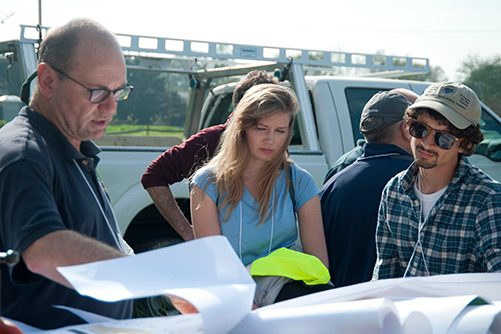
Earth Sciences Research
The major areas of study in the Department of Earth Sciences (ES) include geochemistry, geomorphology, hydrology and geobiology, as well as more traditional research areas in geophysics, petrology, rock mechanics, and paleontology and stratigraphy. Faculty in the department are engaging in multidisciplinary research that significantly contributes to the earth sciences in the larger focus areas listed below.
Focus areas
Geobiology and Environmental Geochemistry
Several faculty and their students in the Department conduct research in geobiology and environmental geochemistry. In geomicrobiology, the work is multidisciplinary, combining geochemical field characterization and sampling, molecular biology, biochemistry, microbiology and a wide variety of microscopy and spectroscopy techniques to study how microorganisms affect environmental chemistry and how chemistry selects for and influences the evolution of life. Various microfossil taxa including foraminiferal assemblages are used in environmental micropaleontology to determine natural and anthropogenic impacts on estuaries and tidal rivers such as sea-level rise, deforestation, and pollution, and combined with strontium isotope stratigraphy to better delineate the occurrence of subsurface aquifers and aquicludes.
Research in environmental geochemistry is conducted from a molecular to a global scale, including investigations of the mechanisms of carbonate nucleation/growth and the influence of organic templates and living interfaces on these processes, unraveling the biogeochemical behavior of radiogenic isotope and rare earth element concentrations in the modern ocean, submarine groundwater discharge and associated chemical fluxes, and the development and application of new methods in isotope geochemistry and in synchrotron radiation studies of mineral-fluid interactions.
Solid Earth Geochemistry and Geophysics
Our faculty and their students examine samples of peridotite – the main rock of the upper mantle – and use seismology – the study of the passage of waves generated by earthquakes and other sources – to examine modern surface deformation and the physical and chemical processes, mechanisms and driving forces that govern plate tectonics. Their research investigates the role of the mantle in the plate tectonic cycle, from the generation of lithospheric plates at ocean ridges to their destruction at subduction zones, as well as the flow that occurs within the convecting interior of the Earth.
They also use a variety of high-resolution geophysical techniques including ground penetrating radar, side-scan sonar, shallow seismic reflection, and geoelectrical techniques to study Quaternary stratigraphy, integrated biogeophysical systems, and coastal, estuarine, and riverine benthic habitats.
Hydrology and Geomorphology
Earth Sciences faculty and their students combine field work, lab studies, and numerical modeling to research groundwater flow, fluvial geomorphology, and modifications to Earth’s surface as a result of changes in climate and human activities.
Areas of study include: coastal groundwater dynamics, groundwater-surface water interaction, groundwater flow and solute transport modeling, geostatistical modeling of subsurface heterogeneity, hydro-economics, effects of dams and dam removal on rivers, novel methods for measuring and modeling river bank erosion, documenting sediment residence times using fallout radionuclide tracers, quantifying temporal scales of fine-grained sediment transport and storage through watersheds using sediment budget data and mathematical models, climatic geomorphology, and geoarchaeology.
Facilities and resources
Environmental Isotope Science Lab
The Environmental Isotope Science Laboratory (EISL) is a facility for stable isotope-ratio measurements and environmental radioactivity that is housed in the Department of Earth Sciences at the University of Delaware (UD). It is directed by Prof. Neil Sturchio and staffed by a full-time Laboratory Manager. Read more >
EISL equipment
Conflo-IV reference interface; Trace GC 1310 having PTV injector; ISQ II LT GC/qMS; GC Isolink II combustion/thermal conversion preparation device; TriPlus autosampler.
With dual-inlet and multiple continuous-flow inlet systems [Carlo-Erba NCS-2500 elemental analyzer; Gas Bench® automated gas handling system; Conflo-III gas chromatograph-combustion interface with HP 6890 gas chromatograph; LEAP CombiPal autosampler; and custom-built system for continuous-flow purification and stable isotopic analysis of Cl as CH3Cl.
A Canberra reverse-electrode intrinsic Ge detector system (34% relative efficiency at 1.33 MeV); an ORTEC model GEM-115220-P-S detector (122% relative efficiency at 1.33 MeV; and two new ORTEC well-geometry Ge detector systems (15-mm well diameter, 25% relative efficiency at 1.33 MeV). All gamma detectors are housed in low-background 10-cm lead shields; have ORTEC DSPEC series digital signal analyzers interfaced with the Maestro-2000 multichannel analyzer software package for data acquisition.
(~1 background count per day per alpha peak from 3 to 8 MeV) interfaced via Ethernet link with a PC for acquisition and analysis of alpha spectrometry data.
Equipped with multiple fume hoods, furnaces, ovens, balances, centrifuges, various glass and Teflon labware, ultrapure deionized water systems, and vacuum manifolds for sample preparation.
Locations
Stable Isotope-Ratio Mass Spectrometry Laboratory
251 Patrick Harker Interdisciplinary Science and Engineering Laboratory (Harker ISE Lab)
221 Academy Street
Newark, DE 19716
Environmental Radioactivity Laboratory
007 Penny Hall
255 Academy Street
Newark, DE 19716

MakerSpaces
Both CEOE and UD offer multiple MakerSpaces to encourage innovation and hands-on invention. The Robotic Discovery Laboratories (see entry below) include a workshop with tools for fabricating and modifying autonomous systems and other cutting-edge technology. Together with other spaces in the UD MakerNetwork, the Visualization and Advanced Simulation Training (VAST) Lab, the Geotechnology Education Lab (GEL), and the university’s newly opened MakerGym provide maker resources to students on main campus. Read more >
Newark locations:
UD MakerGym
Pearson Hall
125 Academy Street
Newark, DE 19716
Faculty lead: Art Trembanis
VAST Lab
Penny Hall (basement)
255 Academy Street
Newark, DE 19716
Lab director: Art Trembanis
Geotechnology Education Lab
203A Penny Hall
255 Academy Street
Newark, DE 19716
Lab director: Michael O'Neal
Lewes Location:
Robotic Discovery Laboratories
161 Otis H. Smith Laboratory
College Drive
Lewes, DE 19958
Official page

OUTREACH
Delaware Geological Survey
The Delaware Geological Survey (DGS) is a state agency that conducts geologic and hydrologic research, service and exploration.
